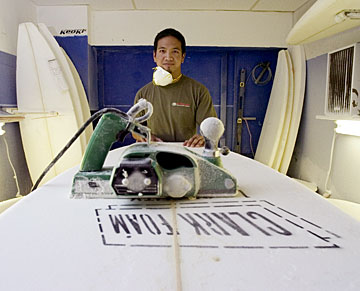
CINDY ELLEN RUSSELL / CRUSSELL@STARBULLETIN.COM
Keoki Ching shaped his first surfboard 12 years ago and began his own business about six years ago. The closure of Clark Foam leaves the future of his burgeoning shop uncertain. "Everything is just on hold right now," Ching said yesterday. "We can't make an informed decision."
|
|
Surfboard prices shoot up
A foam firm's closure forces shops to raise rates as high as $100
Staff and news reports
Surf shops in Hawaii and California raised prices and hoarders went to work after the sudden closure of Clark Foam, a company that provided the cores for most of the world's surfboards.
Prices of new boards built on Clark's polyester "blanks" leaped as much as $100 at isle shops yesterday, and surfboard creators were struggling to arrange new supplies.
"The pipeline's been snipped. ... People are on a scramble," said Sean Mattison at Surf Ride surf shop in Oceanside, Calif.
On Oahu, surfboard shaper Keoki Ching, who works below Turbo Surf on Kapahulu Avenue, said he increased prices for his custom-made surfboards by $100 after news of Clark Foam's closure surfaced this week.
Ching, who shapes about 800 shortboards and longboards a year ranging between $450 and $1,000, said he increased prices in anticipation of a lack of availability in blankboards.
"If Clark Foam should shut down and there's no Clark Foam, then I'll have nothing for the next three months," Ching, 30, said.
He said he increased the price for each board so that he can pay his monthly bills.
Ching, who dealt only with Clark Foam for surfboard blankboards, has put a halt on production until he gets more information about the California company's future.
General manager Joe Kelling of Turbo Surf said, "For a lot of shapers, that's all they have for income is shaping."
Ninety percent of the surfboards at Turbo Surf are made by blankboards from Clark Foam, Kelling said.
"I think right now everyone is in a panic in terms of shapers, and the customers are going to feel it when they try to order a board and the shaper will say they can't add it. They won't be able to get the board," he added.
Clark Foam, founded in 1961 in Laguna Niguel, Calif., had cornered perhaps 90 percent of the market for polyester blanks by undercutting competitors and producing as many as 1,000 a day through techniques that owner Gordon "Grubby" Clark perfected.
Manufacturers in Asia, Australia and elsewhere produce only a trickle by comparison, and their stocks will take weeks to reach the United States, surfboard industry experts said.
Hundreds of jobs could be lost in the short term, said Rusty Preisendorfer, a noted surfboard maker in San Diego.
"Imagine Ford, Chrysler and GM not being able to put wheels on their cars," he said.
The virtual U.S. monopoly on surfboard cores also appears at an end, experts suggested. The gap left by Clark Foam's demise, they said, will be filled by companies operating in countries with cheaper labor and less stringent pollution controls.
In a Monday letter to customers explaining his closure, owner Gordon Clark said he increasingly had been in trouble with state and local government because of his nonstandard production machinery, most of which he designed himself, and his use of toxic and polluting chemicals. The company also has safety issues.
"Our official safety record as an employer is not very good," he wrote. "We have three ex-employees on full Workman's Compensation disability -- evidently for life. There is another claim being made by the widow of an employee who died from cancer. According to the claim, the chemicals or resins at Clark Foam caused the cancer."
Clark acknowledged that his work releases chemicals into the air, including toluene diisocyanate, a carcinogen, and more than 2 tons of styrene fumes a year. Meeting increasingly stringent environmental regulations would cost millions of dollars, Clark wrote.
Clark said he had no plans to set up elsewhere and would concentrate for the moment on trying to get out of "the mess that I created for myself."
"I may be looking at very large fines, civil lawsuits and even time in prison," he wrote.
The Associated Press and Star-Bulletin reporter Rosemarie Bernardo contributed to this article.

